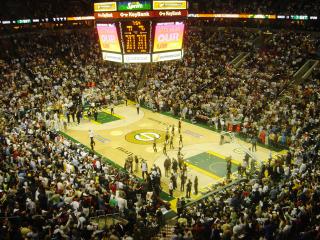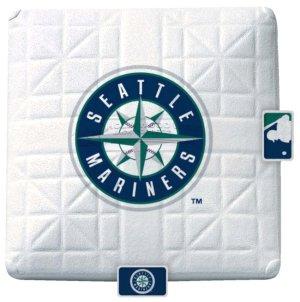
Two years after
Mikki Moore was caught in a numbers game that kept him off the Seattle SuperSonics final roster during training camp, he's back, and this time with a roster spot waiting for him. After adding to his NBA credentials with a strong stint late in the 2003-04 season in Utah and an even better performance while spending all of last season with the L.A. Clippers, Moore re-signed with the Sonics as a free agent Wednesday.
"I wanted to play here two years ago when I tried out here in the preseason, but it was a numbers thing - they couldn't get rid of some of the big guys they had," said Moore. "I like the coaching staff here, I like the team. There's nobody that's really thinking they're bigger than the next person. Everybody has one goal - everybody just wants to win." With
Jerome James' departure as a free agent for the New York Knicks, the Sonics had an opening on the roster for another veteran center. And while you would never know it from the hype that surrounded them, James and Moore posted very similar statistical lines in 2004-05. James averaged 4.9 points and 3.0 rebounds per game, shooting 50.9% from the field, while Moore posted averages of 5.4 points and 3.3 rebounds and shot 50.2%.
"We basically, like most teams in this league, do center by committee," said Sonics GM Rick Sund. "We needed to get another committee member. We've got a couple of young guys in
(Robert) Swift and
(Johan) Petro with Vitaly and now Mikki. Mikki's 7-foot and a little different player than Jerome, but their stats are virtually the same. Mikki runs the floor a little better, Jerome gives a little more bulk."
Moore and
Vitaly Potapenko, whom the Sonics re-signed last week, likely will enter training camp as the frontrunners for the starting center job.
Nick Collison and
Danny Fortson, who also play power forward, and Swift and Petro also figure into the mix. Moore is taking nothing for granted as far as his role.
"I don't know exactly how it's going to fall into place," he said. "I'm just coming in to work out hard and grab a position, give this team every bit of energy that I have. I don't know if I'm going to be a backup, I don't know if I'm going to be backing up a backup or I don't know if I'm going to be a starter. I'm not really looking at it like that. I'm just looking at it as coming in with an opportunity to play ball."
"Nobody's got a slot locked up," said Sonics Coach
Bob Weiss. "I've got a sneaking suspicion Ray (Allen) will start, but he's got to come here and earn it every year. Ray knows that - he'd be the first guy to tell you that."
Competition is nothing new to Moore. Undrafted out of Nebraska, he spent most of his first two years in the CBA before hooking on with the Detroit Pistons (with Sund then in the Detroit front office). He's also spent time in the NBDL, but has produced whenever he's gotten an opportunity and is a career 52.2% shooter.
"I think the Sonics embrace guys who work hard," said Moore. "They don't look at prima donnas, put it that way. They don't look at guys just because you went to this college, you're going to get a contract, or just because you were drafted this high in the first round three years ago, four years ago, you're going to get a job. They're looking at what you're going to bring to the team and how you're going to produce. That's a big thing for me, because I've been struggling my entire career to prove that just because I came from the CBA up doesn't mean I can't play ball. Mr. Sund knows that, as well as the Sonics coaching staff."
Another player who fits that same mold is guard
Rick Brunson, the Sonics other free-agent acquisition this summer and Moore's teammate with the Clippers. ("Most of my success with the Clippers was because of Rick," explained Moore. "He can see the floor very well.") Like Brunson, Moore felt like the Sonics made him feel wanted as a free agent.
"The way that Rick called me himself on my cellphone and we sat down and talked, it made me feel like I was already home," Moore said. "I love the city here. I loved the city when I was here two years ago. The way they approached the whole situation made me feel like I should be here and was supposed to be here."
Moore chose the Sonics over six or seven other teams who showed interest. Notably, in addition to the Sonics, the Clippers and Jazz - the last two teams Moore played for - were also finalists for his services, showing they were interested in a return engagement after having Moore on the roster. The Sonics gained the upper hand thanks to their willingness to grant Moore a player option after this season as well as their success last year.
"That's one of the reasons why I chose the team, is because the core of the team is still here," he said. "They were very successful last year. With my mindset that I'm coming in with, I can only be a plus."
Moore brings the Sonics a defensive presence thanks to his length and ability to block shots, as well as quality finishing ability in the paint. Sund also praised Moore's basketball IQ.
"He knows who he is," said Sund. "Probably one of the good basketball elements that he brings is he's got a good basketball IQ. It was interesting … I called Brunson on him before we signed the deal, just to get his take as a teammate. He had a lot of good things to say, said his feel for the game is very good."
Moore is the 11th player the Sonics have under contract for the 2005-06 season as their final roster continues to take shape. In the remaining month until the beginning of training camp, the key issue will be the status of restricted free agents
Reggie Evans,
Ronald "Flip" Murray and
Vladimir Radmanovic. Even with a frontcourt that is now getting somewhat crowded, Sund indicated the Sonics will have room to bring back all three players should they choose.
"There's no concern, because you won't be able to find minutes for all the guys," noted Weiss. "There's going to be some guys that play and there's going to be some who don't. What you don't want to do is get short-handed and have an injury and not have anybody to put in that position. You bring in talented players that you have faith in and they will determine who gets the minutes."
"One of our concerns has been, and probably always will be - unless you have a
(Tim) Duncan or a
Shaq (O'Neal) - having enough depth at the center position with enough flexibility so you can match up with all the different teams, because teams give you different looks," said Sund. "That was a strength last year, and it will be another strength for us this year. We have the strength with Vitaly, versatility and talent with a guy like Nick Collison, a low-post game. You have some length now and running ability in Mikki and some youth in Petro and Robert and some toughness and bulk in Danny."




